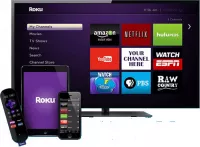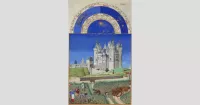PBS Kids is the brand name for children's programming broadcast by PBS, a public television network in the United States. It includes a daytime programming block that airs on most PBS member stations, a dedicated 24-hour channel available on digital subchannels, and various digital platforms.
August 1993: Introduction of P-Pals
In August 1993, PBS introduced new branding for their children's programs featuring the "P-Pals", animated characters shaped like the PBS "P-head" logo.
1993: Introduction of PTV
In 1993, PTV was first introduced on selected PBS stations as branding for existing children's programming.
July 11, 1994: Launch of PTV block
On July 11, 1994, PBS repackaged their existing children's educational programming as a new block titled "PTV", airing on 11 member stations at launch.
June 26, 1995: Apple Computer grant to PTV
On June 26, 1995, Apple Computer provided a $1.5 million grant to PTV and became its first national underwriter.
January 8, 1996: "Ready To Learn" Grant Unveiled
On January 8, 1996, a "Ready To Learn" grant supported the development of Dragon Tales and Between the Lions.
September 1996: PTV Service Expansion
By September 1996, 95 PBS stations reaching three quarters of the United States were carrying the PTV service.
October 7, 1996: Launch of The Game block
Starting on October 7, 1996, PBS packaged their programs for school-aged children into the block The Game, airing on 31 stations by the end of the year.
January 18, 1999: Announcement of PBS Kids Channel launch
On January 18, 1999, PBS announced that it would launch the PBS Kids Channel in September.
September 6, 1999: PBS Kids Rebranding
On September 6, 1999, the rebranding to "PBS Kids" first took effect, with the launch of the 24-hour PBS Kids Channel.
1999: Dragon Tales premiered
In 1999, Dragon Tales premiered as part of the "Ready to Learn" initiative.
1999: Introduction of PBS Kids
In 1999, PBS Kids was first introduced, succeeding PTV, and included the launch of a PBS Kids channel.
1999: First iteration of PBS Kids Channel
In 1999, the first iteration of the PBS Kids Channel existed.
February 1, 2000: Relaunch of PBS Kids website
The PBS Kids website was relaunched with new areas on February 1, 2000.
2000: Between the Lions premiered
In 2000, Between the Lions premiered as part of the "Ready to Learn" initiative.
2002: PBS Kids Channel Household Reach
As of 2002, the PBS Kids Channel had only reached 9 million households.
October 2004: Launch of PBS Kids Go! sub-block
In October 2004, PBS Kids launched a late-afternoon sub-block known as PBS Kids Go!, featuring programming for school-aged children.
2004: Launch of PBS Kids Go! sub-block
In 2004, PBS Kids launched the PBS Kids Go! sub-block, which targeted elementary school-aged viewers between 6 and 8 years old.
2005: Partnership to operate PBS Kids Sprout
From 2005, PBS partnered with Comcast, HIT Entertainment, and Sesame Workshop to operate PBS Kids Sprout, an ad-supported cable network.
2005: PBS Kids Channel Replacement
In 2005, PBS entered into a commercial joint venture with Comcast, HIT Entertainment, and Sesame Workshop to launch PBS Kids Sprout as a replacement for the PBS Kids Channel.
2005: Shutdown of PBS Kids Channel
In 2005, PBS shut down the PBS Kids Channel and it was effectively supplanted by PBS Kids Sprout.
2005: First iteration of PBS Kids Channel ended
In 2005, the first iteration of the PBS Kids Channel ended.
April 2006: Announcement of PBS Kids Go! Channel
In April 2006, PBS announced plans for a replacement 24-hour digital multicast network called the PBS Kids Go! Channel.
October 2006: PBS Kids Go! Channel Launch Delayed
In October 2006, the planned launch of the PBS Kids Go! Channel was delayed. PBS stations determined that the sliding scale licensing fees were too high, especially after budgeting for the PBS HD feed. With only one-third of PBS stations committing, plans for the channel were withdrawn.
October 2006: Cancellation of PBS Kids Go! Channel
PBS had planned to launch a dedicated PBS Kids Go! channel as a digital network in October 2006, but it was later cancelled before launch.
September 8, 2008: Launch of PBS Kids Go! video player
On September 8, 2008, PBS launched the PBS Kids Go! video player on its website.
May 12, 2011: Launch of PBS Kids Video app
On May 12, 2011, the PBS Kids Video app initially became publicly available for free.
May 8, 2013: Addition of PBS Kids programming to Roku
On May 8, 2013, PBS Kids programming was added to the Roku streaming player.
October 2013: Discontinuation of PBS Kids Go!
In October 2013, PBS Kids Go! was discontinued as part of a rebranding of the PBS Kids block.
2013: Comcast Acquires PBS Kids Sprout
In 2013, Comcast acquired PBS Kids Sprout outright through its NBCUniversal division.
2013: Comcast Assumes Full Ownership of Sprout
In 2013, Comcast, via subsidiary NBCUniversal, assumed full ownership of PBS Kids Sprout after partners sold their stakes.
2013: Discontinuation of PBS Kids Go!
In 2013, the PBS Kids Go! brand was discontinued to allow for more focus on the main PBS Kids brand.
February 23, 2016: PBS Announces Revival of 24/7 PBS Kids Channel
On February 23, 2016, PBS announced that the 24/7 PBS Kids channel would be revived after 11 years. PBS president and CEO Paula Kerger stated that during PBS's partnership with Comcast in their operations of Sprout, PBS had discovered the valuable position in children's programming during prime time.
July 1, 2016: Agreement between Amazon Prime Video and PBS Distribution
On July 1, 2016, Amazon Prime Video and PBS Distribution entered into a multi-year agreement, with several PBS Kids series moving to Amazon Prime Video.
2016: PBS Kids Channel Relaunch Planned
In 2016, the PBS Kids channel was originally set for a fall relaunch, however the relaunch was delayed to January 2017.
January 16, 2017: Revival of PBS Kids Channel
On January 16, 2017, PBS revived the PBS Kids Channel as an over-the-top and digital multicast television network.
April 21, 2017: Launch of PBS Kids Family Night
On April 21, 2017, the PBS Kids channel launched "PBS Kids Family Night," a weekly block on Friday evenings with encore airings on Saturday and Sunday evenings. It showcases themed programming, premieres or special "movie-length" episodes of new and existing PBS Kids children's programs.
2017: Relaunch of PBS Kids Channel
In 2017, PBS Kids relaunched its 24-hour channel, operating via digital terrestrial television and streaming.
2017: Second iteration of PBS Kids Channel launched
In 2017, the second iteration of the PBS Kids Channel launched.
May 22, 2019: Launch of PBS Kids in Sub-Saharan Africa
On May 22, 2019, PBS Distribution partnered with MultiChoice to launch PBS Kids on DStv and GOtv platforms across its Sub-Saharan Africa footprint.
November 2020: PBS Kids becomes home of Peanuts specials
In November 2020, PBS Kids, in association with the main PBS service, became the terrestrial television home of select specials from the Peanuts animated library under a sub-licensing agreement with Apple TV+.
July 1, 2021: Launch of PBS Kids in Australia
On July 1, 2021, PBS Distribution partnered with Foxtel to launch PBS Kids in Australia.
2021: End of Peanuts specials agreement with PBS
After the 2021 holiday season, the agreement between PBS and Apple TV+ for the Peanuts specials ended, removing them from American broadcast television.
July 19, 2022: Introduction of new brand identity
On July 19, 2022, PBS Kids introduced a new brand identity by Lippincott, incorporating aspects of the current PBS branding and featuring customizable cartoon characters.
February 2023: Reduction of PBS Kids block duration
In February 2023, a major shift in program scheduling reduced the duration of the daytime PBS Kids block on local PBS stations from 13 hours to 8 hours.
July 1, 2023: Discontinuation of PBS Kids in Australia
The PBS Kids channel was discontinued two years later on July 1, 2023, in Australia.
April 23, 2024: The Roku Channel adds PBS Retro
On April 23, 2024, The Roku Channel added PBS Retro, a free ad-supported streaming channel, which consists of older PBS Kids programming, such as Mister Rogers' Neighborhood and Reading Rainbow.
August 2024: Discontinuation of PBS Kids in Sub-Saharan Africa
The PBS Kids channel was discontinued by the end of August 2024, in Sub-Saharan Africa.
Mentioned in this timeline

Roku Inc is an American company that owns the Roku...

Amazon Prime is a subscription service offering a variety of...

An apple is a widely cultivated round edible fruit originating...
Amazon Prime Video is a subscription-based video streaming service owned...
Australia officially the Commonwealth of Australia encompasses the Australian mainland...

September is the ninth month of the year in the...
Trending
57 minutes ago Ameren Prices $400M Senior Notes, $900M Bonds for Grid Investment, Reshaping Debt
2 hours ago Pokemon Celebrates 30 Years: A Cultural Phenomenon with Multimillion-Dollar Cards

2 hours ago Daylight Saving Time 2026: Prepare to set your clocks forward and lose sleep.

2 hours ago Indiana Investigates CenterPoint Energy Amid Bill Concerns and New Utility Law.

2 hours ago Galatasaray's Champions League opponent revealed; Liverpool legend comments on Juventus match; Real Madrid faces Man City.

4 hours ago Google Maps to fully function in South Korea after data agreement.
Popular

Jesse Jackson is an American civil rights activist politician and...

Barack Obama the th U S President - was the...

Susan Rice is an American diplomat and public official prominent...

XXXTentacion born Jahseh Dwayne Ricardo Onfroy was a controversial yet...

Michael Joseph Jackson the King of Pop was a highly...

Kashyap Pramod Patel is an American lawyer who became the...